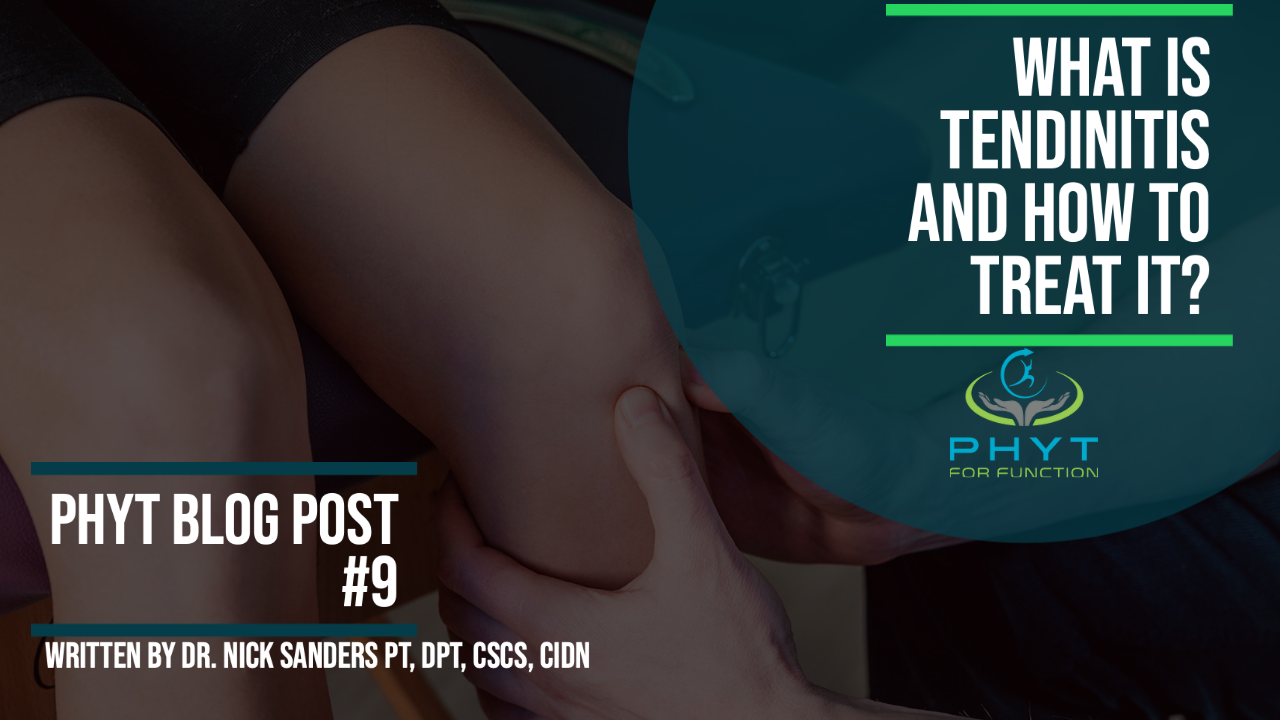What is tendinitis? How Do We Fix It?
Dec 30, 2021
What is tendinitis? How Do We Fix It?
Outline.
- What is a tendon?
- A Tendon is the dense connective tissue that attaches a muscle to a bone. If you have ever cooked chicken tenderloins. It is that annoying white piece that you have to cut off each piece.
- Qualities of a Tendon.
- Dense connective tissue that is designed to transmit force and energy through the body.
- Stiffer Tendons.
- Transmit more force quickly / power.
- Running, jumping, throwing, etc.
- Tend to be shorter
- Potentially increase risk of muscle strains.
- Less Stiff Tendon
- Lengthen easier, more pliable, but transmit less force
- Think Yoga
- Potentially less risk of muscle strain but also less capable of generating power.
- Why do we get Tendon Pain?
- Microtrauma.
- Prolonged damage to a tendon caused by some form of stress leads to inflammation.
- Normal recovery the body repairs the damage cells and everything gets built back stronger.
- If because of repeated stress that your body can’t repair you may get increased inflammation that makes the area more sensitive.
- Nerve Sensitization
- With prolonged inflammation you may notice an irritability of the nerve, the skin may be more sensitive and you may be more reactive to normal types of pressure or stimulus.
- Tendinitis.
- Inflammation of the tendon that causes an increase in pain during palpation or use of the tendon.
- Tendinosis.
- A degeneration of the collagen may occur over time if the tendon repair process and inflammation is left unchecked. For more detailed information on the topic click here: https://rb.gy/a2l1mp
- How do we fix it:
- Tissue Density Problems.
- If you tend to be a stiff / powerful person
- Add in long slow holds like isometic exercises.
- See this example for a Push-Up isomtric exercise. https://www.youtube.com/watch?v=Y_yUHQ5ZRlE
- Deciding how much and how often to load is the challenge.
- Need Enough stress to stimulate a change.
- Not so much that you can’t repair the change.
- If you tend to be a hypermobile person:
- Add in weightlifting and even progressing to plyometric type exercises that will promote tendon stiffness.
- Again the challenge is to load appropriately.
- See this example of a jump landing.
- Nerve Sensitization.
- In this scenario we need to determine why the nerve is mad at you. There are 4 options.
- 1. Local irritation of the tissue
- 2. Irritation of the nerve somewhere along its path.
- 3. An imbalance of the autonomic nervous system.
- Fight / Flight (sympathetic) vs. Rest /Digest (Parasympathetic.
- 4. Chronic pain leading to changes in the way your brain actually process the information from the nerves.
- ***It is beyond the scope of this paper to discuss how we sort which of these things is the primary culprit. We just want you to know they exist!
- Tendinosis
- We need to rebuild the collagen or connective tissue that makes up the tendon itself.
- Couple of ways we can do this.
- Local Dry Needling into the tendon.
- Triggers fibroblasts that cause regrowth.
- Progressive exercise loading.
- Similar to above on tendon length. Typically With Progressive Isometric and eccentric exercises.
- Blood Flow Restriction Training.
- BFR stimulates fibroblasts and a host of other repair molecules similar to high intensity exercise without the risks.
- Nutrition.
- You Must have the building blocks for collagen growth. We recommend two things.
- 30 min pre-workout consume
- Bone collagen needs to be present to rebuild the connective tissue.
- Our favorite is Great Lakes Bone Collagen.
- Amazon affiliate link (we appreciate the support)= https://amzn.to/3GK85S4
- Vitamin C. Is a precursor to the cell pathways to rebuild connective tissue.
- In depth information at the following link
Written by Dr. Nicholas Sanders PT, DPT, CSCS, CIDN. Dr. Sanders is the founder and owner of PHYT For Function where we provide a convenient and simple solution for people to continue to do the activities they love without muscle, joint, or nerve pain. He is a national instructor for Integrative Dry Needling and Co-Creator of a Neuro-Inflammatory Manual Therapy course.
Stay connected with news and updates!
Join our mailing list to receive the latest news and updates from our team including a weekly 5 Line Newsletter on health and fitness
Don't worry, your information will not be shared.
We hate SPAM. We will never sell your information, for any reason.

